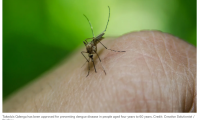-
Biogen’s new strategy brings more pipeline cuts, but leaves deal options open
- Source: drugdu
- 181
- April 27, 2023
-
Drugmakers take sides in Amgen, Regeneron fight over antibody patents
- Source: drugdu
- 170
- April 25, 2023
-
Pre- and post-surgical immunotherapy-based treatment significantly improved lung cancer outcomes
- Source: drugdu
- 123
- April 18, 2023
-
The policy, and politics, of Medicare Advantage
- Source: drugdu
- 131
- April 17, 2023
-
FDA, citing safety concerns, places partial hold on Merck KGaA’s MS drug
- Source: drugdu
- 200
- April 13, 2023
-
Brazil’s ANVISA approves Takeda’s dengue vaccine Qdenga
- Source: drugdu
- 143
- March 17, 2023
-
China’s Import and Export Market Report of Diabetes Drugs
- Source: Ddu
- 49,927
- August 25, 2021
-
Positive topline results for nirsevimab in RSV
- Source: drugdu
- 112
- April 26, 2021
-
Four medicines accepted for use by NHS Scotland
- Source: drugdu
- 224
- April 14, 2021
-
PFIZER AND BIONTECH ANNOUNCE VACCINE CANDIDATE AGAINST COVID-19 ACHIEVED SUCCESS IN FIRST INTERIM ANALYSIS FROM PHASE 3 STUDY
- Source: drugdu
- 1,240
- November 10, 2020
your submission has already been received.
OK
Subscribe
Please enter a valid Email address!
Submit
The most relevant industry news & insight will be sent to you every two weeks.













